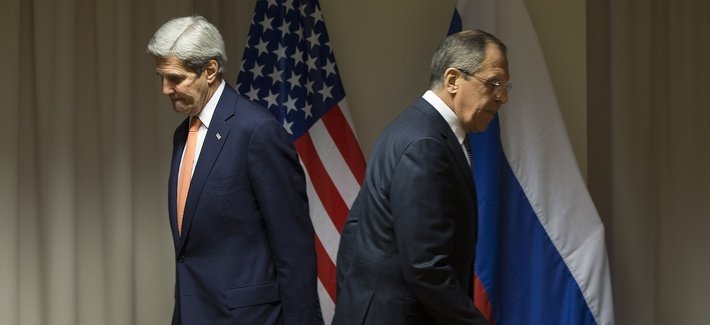Want Peace in Syria? Put Women at the Negotiating Table
SYRIA IN CONTEXT, 8 Feb 2016
Matthew Rycroft and Swanee Hunt, Defense One – TRANSCEND Media Service
That’s what the Balkan experience tells us, say current and former British and US ambassadors.

U.S. Secretary of State John Kerry, left, and Russian Foreign Minister Sergey Lavrov walk to their seats for a meeting about Syria, in Zurich, Switzerland, on Wednesday, Jan. 20, 2016. Jacquelyn Martin/AP
29 Jan 2016 – With a fresh diplomatic push under way to restart Syrian peace talks this month, we should absorb a critical lesson from the Bosnia conflict as we grapple for a way out of the Syria deadlock: To create sustainable peace, women must have a seat at the negotiating table.
Women suffer disproportionately in modern war, but they are also often leading actors in building security. A recent study of 182 agreements showed that peace accords are 35 percent more likely to last at least 15 years if women are at the table.
As diplomats in the Balkans two decades ago, we watched as the failure to include women in peace negotiations contributed to a divisive, paralyzing political settlement. Now governments in the region are recognizing women as a critical resource for stabilization.
As examples, Bosnia’s strong national strategy to advance women as decision makers has increased female recruitment in police and military forces. And women are in the vanguard of officials and non-governmental organizations from Serbia, Bosnia, and other Balkan states, devising strategies to tackle challenges as intractable as the migrant crisis.
We should apply these lessons to Syria, where civil war has killed a quarter-million people and strewn refugees and extremist violence across the Middle East and beyond. As a new round of peace talks approaches, what if we insisted on gender parity at the negotiating tables, or at least a critical mass say, 30 percent women? Drawing from the pool of female civil society leaders already bridging divides would surely boost the chances for success.
Here’s what our experience tells us: By including groups of women, all parties will be more likely to address practical issues that matter to ordinary people, and buy-in to the agreement will be broader-based and more durable.
Tackling violence against women is an urgent priority, but that in no way obscures the crucial point: women aren’t merely “recipients” of security—they are providers as well. They know first-hand the dangers—and the solutions. Our responsibility is to ensure they have opportunities to lead.
To grasp the kind of commitment we’re missing, we’ve only to look to the women of Zabadani near the Syria-Lebanon border. Nearly 500 of them have put their lives on the line for months by publicly pressuring all parties for a ceasefire, which has largely held since September.
As we look for ways to root out terrorism, it is wise to recognize that women are often best placed to spot signs of radicalization and to counter it, given their central role in the family and the community.
The U.N. Security Council has at last come together to support a peace plan, and the world cannot afford to let this moment slip away. We must make 2016 the year that violence and suffering in Syria finally end. The Council has embraced an inclusive approach. In December, Resolution 2254 endorsed a peace process for Syria; the measure insists on the meaningful participation of women.
We commend U.N. Special Envoy Staffan de Mistura for involving women’s groups in his outreach. This must lead to their involvement as decision-makers at the table. Making that a reality—capitalizing on their talent and knowledge—will at least enable a negotiating climate where the interests of ordinary Syrians and their communities will finally be taken seriously. That’s the path to peace.
___________________________________
Matthew Rycroft, the United Kingdom’s permanent representative to the U.N., was ambassador to Bosnia and Herzegovina from 2005 to 2008, and was a member of the British negotiating team at Dayton. Full Bio
Swanee Hunt was U.S. ambassador to Austria from 1993 to 1997, where she hosted Balkan peace talks; she founded and chairs The Institute for Inclusive Security. Full Bio
Go to Original – defenseone.com
DISCLAIMER: The statements, views and opinions expressed in pieces republished here are solely those of the authors and do not necessarily represent those of TMS. In accordance with title 17 U.S.C. section 107, this material is distributed without profit to those who have expressed a prior interest in receiving the included information for research and educational purposes. TMS has no affiliation whatsoever with the originator of this article nor is TMS endorsed or sponsored by the originator. “GO TO ORIGINAL” links are provided as a convenience to our readers and allow for verification of authenticity. However, as originating pages are often updated by their originating host sites, the versions posted may not match the versions our readers view when clicking the “GO TO ORIGINAL” links. This site contains copyrighted material the use of which has not always been specifically authorized by the copyright owner. We are making such material available in our efforts to advance understanding of environmental, political, human rights, economic, democracy, scientific, and social justice issues, etc. We believe this constitutes a ‘fair use’ of any such copyrighted material as provided for in section 107 of the US Copyright Law. In accordance with Title 17 U.S.C. Section 107, the material on this site is distributed without profit to those who have expressed a prior interest in receiving the included information for research and educational purposes. For more information go to: http://www.law.cornell.edu/uscode/17/107.shtml. If you wish to use copyrighted material from this site for purposes of your own that go beyond ‘fair use’, you must obtain permission from the copyright owner.